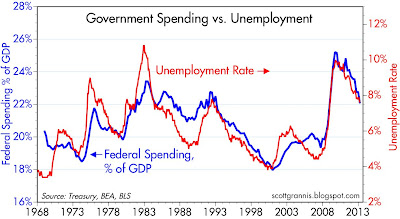Thanks to a gridlocked Congress and a recovering economy, the federal budget has registered some impressive improvements in the past three years. Spending has not increased at all, while tax revenues have surged by over $550 billion, with the result that the burden of the federal budget deficit has dropped almost in half, from 10.5% of GDP to 5.75%. As the federal government absorbs less and less of the economy's output, this opens the door for a stronger private sector. This is a very encouraging development that is not widely appreciated or understood.
For the 12 months ended March, 2013, federal spending was $3.49 trillion. As the chart above shows, spending has not increased at all since the end of the 2008-09 recession. Revenues, in contrast, have risen from a post-recession low of $2.02 trillion to $2.58 trillion in 12 months ended March, 2013. The federal budget deficit has fallen from a high of $1.47 trillion in late 2009 to $910 billion in March of this year. Revenues are now only about $20 billion shy of an all-time high. This is real progress: the best way to grow revenues is to grow the economy without raising tax rates, and the easiest way to "cut" spending is to just not let it grow.
Despite no effective increase in tax rates in recent years (and in fact a 2-yr reduction in payroll taxes), revenues have grown much faster than GDP—as is typical during a recovery.
With spending flat but nominal GDP now up over 15% since the recovery started, federal spending as a percent of GDP has fallen from a high of 25.2% to about 22%. It is now within the post-war historical range.
The chart above combines the previous two charts for a better historical picture of what's happening. Both revenues and spending are slowly but surely coming back into line with their historical averages.
The reduction in the burden of the federal deficit has been impressive, although it is still a bit larger than it was at its Reagan-era peak.
One important source of the reduction in spending has been automatic stabilizers like unemployment insurance. As the economy has grown, the number of people receiving unemployment insurance has declined by 3.3 million from its peak in mid-2010.
Unfortunately, the impressive progress to date in the budget is threatened by the looming onset of Obamacare, which will almost certainly increase government spending significantly as it also raises healthcare costs. Moreover, the financial health of social security worsens with each passing year, due to the very low level of labor force participation and increasing life expectancies. But at least for now we are making excellent progress.
Note: in calculating revenues, spending, and the deficit as a % of GDP, I have assumed that nominal GDP grew at a 4.4% annual rate in the first quarter.
Wednesday, April 10, 2013
Subscribe to:
Post Comments (Atom)











5 comments:
Growth Firming in the OECD Area
10/04/2013 - Composite leading indicators (CLIs), designed to anticipate turning-points in economic activity relative to trend, point to growth picking up in most major economies.
In the United States and Japan, the CLIs continue to point to economic growth firming. The CLI for China provides a more positive outlook compared with last month’s assessment, with the CLI now pointing towards growth picking up.
In the Euro Area as a whole, and in particular in Germany, the CLIs continue to indicate a pick-up in growth. The CLIs point to no further decline in growth in France and to a positive change in momentum in Italy. The CLIs for the United Kingdom, Canada, Brazil and Russia point to growth close to trend rates while the CLI for India indicates weakening growth.
http://www.oecd.org/std/clits/compositeleadingindicatorsclisoecdapril2013.htm
These folks at AAII obviously don't follow Scot Grannis:
Week Ending 4/3/2013
Bullish 35.5%
down 2.9
Neutral 36.3%
up 3.4
Bearish 28.2%
down 0.5
Long-Term Averages:
Bullish: 39.0%
Neutral: 30.5%
Bearish: 30.5%
I agree that Obamacare is not a good idea.
I just wonder, when it comes to deficits, why nobody back in 2001 questioned "looming" defense outlays.
In real terms, defense outlays have doubled since 2001, despite the fact we face about 1 percent of the threat that we did from the old Soviet Union.
We spend $1 trillion a year on Defense, VA and Homeland Security. And the VA budget is skyrocketing. No one leaves the service anymore without getting a "PTSD" monthly disability payment. Unless they get a full pension and full medical for life after 20 years of service.
"just wonder, when it comes to deficits, why nobody back in 2001 questioned "looming" defense outlays."
Trillion dollar deficits vs. $2-300 hundred billion deficits. One is bad, the other is ruinous.
Congress never discussed them and gave Carte Blanc to Homeland Security after its authorization and consolidation of 12 departments including the Coast Guard, Costumes,Immigration and Naturalization Service, U.S. Border Patrol, etc. The Iraq was placed off budget and not consider during the budget process but funded separately as an "emergency" item.
Post a Comment